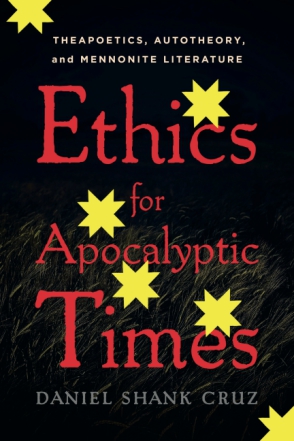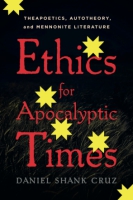
Ethics for Apocalyptic Times
Theapoetics, Autotheory, and Mennonite Literature
Daniel Shank Cruz
Ethics for Apocalyptic Times
Theapoetics, Autotheory, and Mennonite Literature
Daniel Shank Cruz
“Ethics for Apocalyptic Times is at once memoir, philosophy, literary criticism, theology, and poetry; it concocts a genre of its own through original concepts and methodologies.”
- Description
- Reviews
- Bio
- Table of Contents
- Sample Chapters
- Subjects
In this book, Cruz theorizes theapoetics—a feminist reading strategy that reveals the Divine via literature based on lived experiences—and extends the concept to show how it is queer, decolonial, and equally applicable to secular and religious discourse. Cruz’s analysis focuses on Mennonite literature—including Sofia Samatar’s short story collection Tender and Miriam Toews’s novel Women Talking—but also examines a non-Mennonite text, Samuel R. Delany’s novel The Mad Man, alongside practices of haiku and tarot, to show how reading theapoetically is transferable to other literary traditions.
Weaving together close reading and personal narrative, this pathbreaking book makes a significant and original contribution to the field of Mennonite literary studies. Cruz’s arguments will also be appreciated by literary scholars interested in queer theory and the role of literature in society.
“Ethics for Apocalyptic Times is at once memoir, philosophy, literary criticism, theology, and poetry; it concocts a genre of its own through original concepts and methodologies.”
“Although Ethics for Apocalyptic Times intervenes in an established conversation, it is inherently boundary-pushing and will certainly make an iconoclastic yet constructive contribution. The diversity of voices that Cruz draws from in this book is unparalleled. No other scholar in the conversation is drawing from such a wide source base while also making creative, normative, and critical interventions that unsettle the basic assumptions that many in the field still hold.”
“What I enjoyed overall about this text is Shank Cruz’s honesty about how their life experience has influenced the scholar in them and the way this book has made me more comfortable being the kind of professor that I am. I don’t have to pronounce shibboleth in one way.”
Daniel Shank Cruz (they/multitudes) is a queer, disabled boricua who grew up in New York City and Lancaster, Pennsylvania. Cruz is the author of Queering Mennonite Literature: Archives, Activism, and the Search for Community, also published by Penn State University Press. Their website is https://danielshankcruz.com/.
Acknowledgments
Introduction: Theapoetics and Apocalyptic Times
1. Sofia Samatar’s “Request for an Extension on the Clarity,” Queer Objects, and Theapoetics
2. Theapoetics in Mennonite Poetry, Then and Now
3. Conversing with the Other in Sara Stambaugh’s I Hear the Reaper’s Song
4. Secular Mennonite Ethics in Miriam Toews’s Summer of My Amazing Luck
5. The Theapoetic Ethics of Speculative Fiction
6. Samuel R. Delany’s Surrealist Anabaptist Ethics
Epilogue: Theapoetics and Other Traditions
Notes
Bibliography
Index
Download a PDF sample chapter here: Introduction
Also of Interest
Mailing List
Subscribe to our mailing list and be notified about new titles, journals and catalogs.




